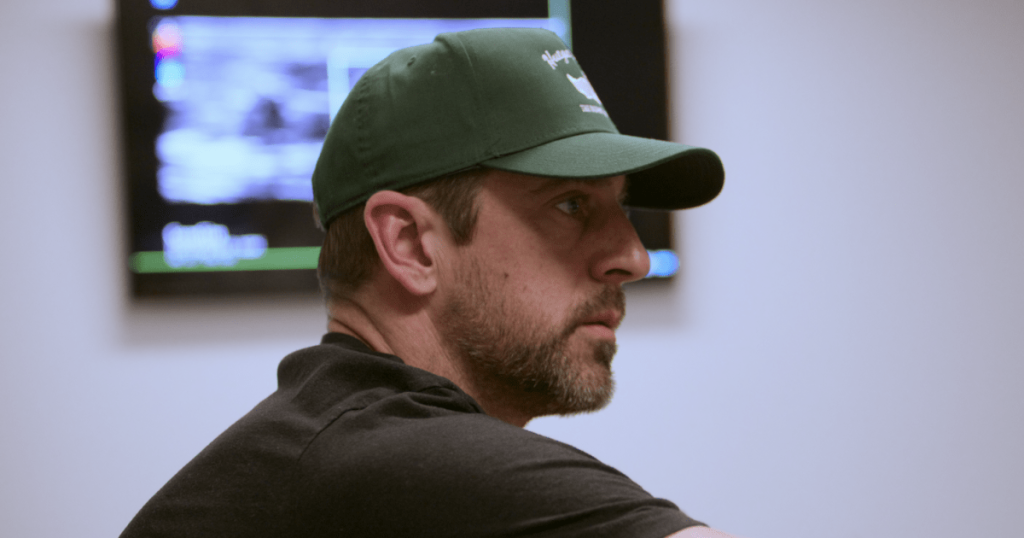Aaron Rodgers’ Netflix docuseries, Aaron Rodgers: Enigma, offers a candid glimpse into the quarterback’s life beyond the football field, delving into his personal journey of self-discovery and the resulting estrangement from his family. While the series chronicles Rodgers’ recovery from a torn Achilles tendon sustained during his debut with the New York Jets, it simultaneously unravels the complex tapestry of his childhood, college years, and time with the Green Bay Packers, highlighting the central theme of his rebellion against his conservative Christian upbringing. This rebellion, characterized by Rodgers’ exploration of alternative spiritual practices and philosophies, created a chasm between him and his parents, Ed and Darla, as well as his brothers, Luke and Jordan. Rodgers’ narrative paints a picture of a young man seeking authenticity and personal truth, even at the cost of familial harmony.
Rodgers recounts growing up in a strict religious environment, one he describes as rigid and judgmental. He felt stifled by the dogma and the black-and-white worldview presented to him, a stark contrast to his own evolving perspective. This struggle for self-expression intensified during his rise to fame, as he felt pressure from family members, according to his account, to downplay his personal life and conform to their expectations. The docuseries suggests that Rodgers’ fame became a catalyst, exacerbating existing tensions and highlighting the diverging paths he and his family were taking. This pressure to remain "smaller," as Rodgers puts it, underscores the inherent conflict between his public persona and his private journey of self-discovery.
The series also explores the impact of his brother Jordan’s appearance on The Bachelorette, an event that seemingly widened the rift within the family. Rodgers expresses his disapproval of the family’s decision to participate in the show, particularly their choice to leave empty chairs for him and his then-girlfriend, Olivia Munn, during a filmed dinner. He interprets this act as a deliberate slight, further solidifying his feelings of distance and disconnect. The Bachelorette incident becomes a symbolic representation of the growing chasm between Rodgers and his family, highlighting the differing values and priorities that contributed to their estrangement. This event, while seemingly trivial in the grand scheme of things, underscores the deep-seated tensions that permeated the family dynamic.
Rodgers’ spiritual awakening, documented in the series, played a significant role in his estrangement from his family. His exploration of alternative religions and practices, including ayahuasca ceremonies, further distanced him from his parents’ traditional beliefs. He recounts his parents’ disapproval of his "alternative lifestyle," creating a sense of alienation and misunderstanding. This clash of values and beliefs further complicates the family dynamic, highlighting the inherent challenges of reconciling divergent worldviews. Rodgers’ openness to unconventional practices, while integral to his personal growth, became a source of contention within his family.
The docuseries provides insights into Rodgers’ upbringing and the factors that shaped his perspective on pain and emotional expression. He recalls his parents’ belief that he had a low pain tolerance, a perception he actively sought to disprove by pushing himself physically. He connects this childhood experience to his approach to injury recovery and his determination to overcome physical challenges. Rodgers also reflects on his father’s stoicism, recalling seeing him cry only once during his childhood. He attributes this lack of emotional expression to his own struggles with emotional intelligence and vulnerability. These reflections offer a glimpse into the family dynamics that shaped Rodgers’ personality and his approach to life’s challenges.
Despite the deep-seated tensions and the distance that has grown between them, Rodgers expresses hope for reconciliation with his family. He acknowledges their differing paths and respects their right to live according to their own beliefs. While acknowledging the hurt and misunderstandings of the past, he maintains a sense of optimism for the future. This glimmer of hope suggests that despite the complexities of their relationship, the possibility of healing and reconnection remains. Rodgers’ vulnerability in expressing this desire for reconciliation underscores the enduring power of family ties, even in the face of significant differences. He recognizes that they are at different stages in their personal journeys, and while he hopes for reconciliation, he also accepts the possibility that it may not happen. This nuanced perspective reflects a mature understanding of the complexities of family relationships and the importance of respecting individual paths to growth and understanding.










